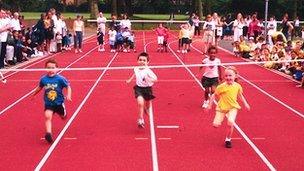School sport at risk, says Labour
- Published
- comments

Labour wants "tough" action to boost sport and PE in schools
Labour says the government has risked "salami slicing" school sport by abolishing a requirement that all pupils do at least two hours PE a week.
The party is calling for "tough action" to deliver a schools' sport legacy to match the success of the Olympics.
It says recent data suggests just more than about half of children do this much exercise, down from 90% in 2010.
The government said it was putting competitive sport at the heart of the new national curriculum.
In a new action plan, launched ahead of Sunday's ģÉČËŋėĘÖ Sports Personality of the year final, Labour calls for the two-hour a week of PE requirement to be reinstated.
Field protection
It argues that the government's reducing of protection for school playing fields has also risked damage to pupils' physical education.
The plan calls for Ofsted to focus more closely on inspecting sport provision in all schools including academies and free schools. This would include looking at outdoor facilities and checking how many hours of sport each school provides for pupils.
The party says that in 2010 figures from the School Sport Survey, which has since been abolished, showed that 90% of children did two hours of sport each week.
It compares this with figures from a poll of parents published last month by the Chance to Shine campaign which suggested that 54% thought their children did less than this each week. Some 81% said the amount of school PE on offer had stayed the same or dropped since the Games.
A Department for Education spokesman said: "The two-hour target was never a rule. It was an unenforceable aspiration that schools were free to ignore.
"We are freeing teachers from such unnecessary targets and paperwork which take up too much time better used in the classroom or at the running track."
'Competitive' culture
He said the government was "putting competitive sport at the heart of the new school curriculum" as well as extending the School Games and spending ÂĢ1bn on youth sport over the next five years.
Tim Lamb of the Sport and Recreation Alliance said the two hours a week target should be the "bare minimum", adding that despite many outstanding initiatives school sport was "an issue still in need of a great deal of attention".
"With recent reports stating that one in three children leaving primary school are either classed as obese or overweight, how many more startling figures about the health of the youngest section of our population do we need to hear before something is done?"
Shadow education secretary Stephen Twigg said: "Getting the next generation into the habit of staying physically active throughout their lives starts in our schools. As well as discovering the Olympic champions of the future, school sport can improve health, wellbeing and academic attainment."
He also said the government had scrapped the school sport survey to hide the damage its policies were doing to school sports and PE.
Clive Efford, the shadow sports minister, added that he would be canvassing views on a national sports strategy at a series of regional summits: "Following the Olympics and Paralympics there is a great deal of enthusiasm for sport, but we lack the structure to deliver this at community level."
A spokeswoman for Ofsted said that its schools inspectors did not look at every subject in detail "for this reason, Ofsted also carries out national curriculum subject surveys and publishes a range of triennial reports including those for PE".
- Published19 November 2012
- Published6 September 2012
- Published20 August 2012
- Published17 August 2012
- Published11 August 2012
- Published9 August 2012